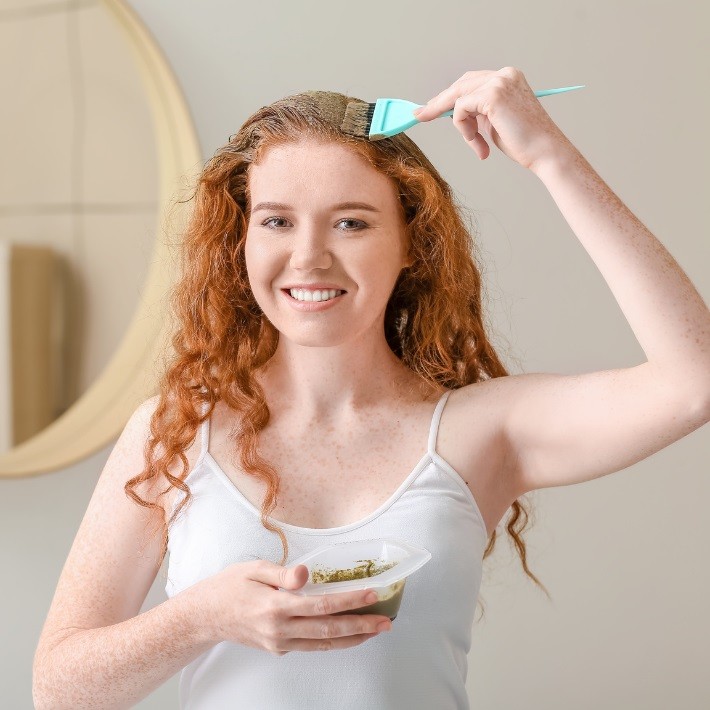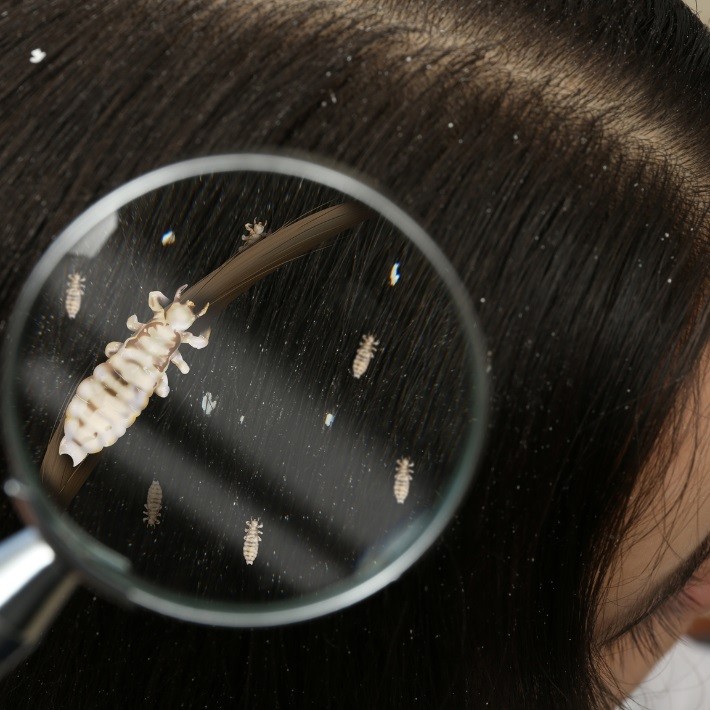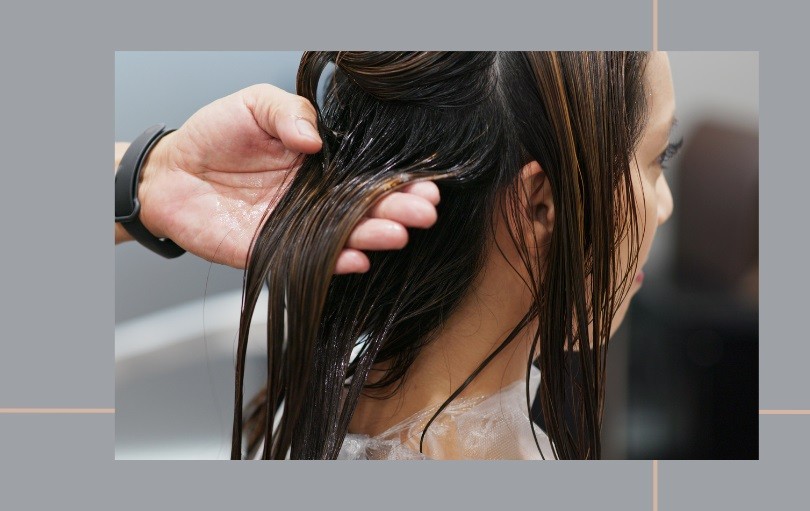Last Updated on March 28, 2025
Head lice are a common nuisance that can affect people of all ages. These tiny insects can cause itchiness, discomfort, and even embarrassment. In our quest to find a quick and easy solution, many have turned to hair dye as a potential remedy. So, does hair dye kill lice? Let’s dive into the colorful world of hair dye and its potential impact on lice infestations.
Does Hair Dye Kill Lice?

Does Hair Dye Kill Lice? It’s a question many people have asked when faced with a head lice infestation. While it might seem like a convenient and easy solution, the truth is that hair dye is not an effective treatment for eliminating lice. Here’s why:
Related: Does Straightening Your Hair Kill Lice?
Hair Dye: Not a Lethal Weapon for Lice
Hair dye might be great for changing your hair color, but it’s not a potent weapon against lice. The chemicals in hair dye can cause some discomfort to the lice, but they aren’t strong enough to kill them outright. Moreover, hair dye is unable to reach the lice eggs (nits) that are firmly attached to the hair shafts, making it an unreliable treatment.
The Resilience of Lice
Lice are notoriously hard creatures, and they have developed resistance to many chemicals found in common treatments. This resilience further reduces the likelihood of hair dye being an effective solution for eradicating lice.
Alternative Treatments: Effective Lice Eradication Strategies
Now that we’ve established that hair dye isn’t the answer to our lice woes, let’s explore some alternative treatments that can effectively eliminate these pesky insects.
Over-the-Counter Treatments
Over-the-counter lice treatments, such as shampoos and creams containing pyrethrins or permethrin, are designed specifically to target lice and their eggs. These treatments are generally safe and effective when used according to the instructions.
Prescription Medications
For more severe infestations or cases where over-the-counter treatments have failed, prescription medications may be necessary. These medications, such as ivermectin, malathion, or benzyl alcohol, are stronger and can be more effective at eliminating lice and their eggs.
Wet Combing
Wet combing is a manual method of lice removal that involves using a fine-toothed comb to remove lice and their eggs from wet hair. This process can be time-consuming but is an effective, chemical-free option for tackling lice infestations.
Myths and Misconceptions: Clearing the Air
As with any common ailment, there are plenty of myths and misconceptions surrounding lice treatment. Let’s set the record straight on a few of the most prevalent misunderstandings.
Myth: Lice Prefer Dirty Hair
Many people believe that lice are attracted to dirty hair, but this is simply not true. Lice can infest anyone, regardless of their hair’s cleanliness.
Myth: Lice Can Jump or Fly
Lice cannot jump or fly; they can only crawl. They spread through direct head-to-head contact or by sharing personal items such as combs, brushes, hats, or headphones.
Related: Does Hair Straightener Kill Lice?
Lice Prevention: Keeping the Pesky Pests at Bay

Establish a Routine
Implement a regular routine of checking your hair and your family members’ hair for any signs of lice. Catching an infestation early on can make the treatment process much easier and more effective.
Hair Care Habits
Keep long hair tied up or braided to minimize the risk of lice spreading. Additionally, using lice-repellent products like shampoos or sprays containing natural ingredients like tea tree oil, eucalyptus, or lavender can help deter lice from making a home in your hair.
Cleanliness and Personal Items
Maintain a clean environment and avoid sharing personal items like combs, brushes, hats, and headphones, which can be breeding grounds for lice. Regularly washing bedding, clothing, and other items in hot water can also help reduce the likelihood of an infestation.
Stay Informed and Spread Awareness
Stay up-to-date on the latest lice prevention methods and share this information with your friends, family, and community. By increasing awareness about lice prevention strategies, you can help minimize the spread of infestations and contribute to a healthier environment for everyone.
The Psychological Impact of Lice Infestations: Addressing the Stigma
Addressing the Emotional Toll
Lice infestations can cause embarrassment, anxiety, and even social isolation for those affected. It’s essential to provide emotional support and reassurance to help individuals cope with the psychological impact of lice.
Dispelling the Myths and Misinformation
Educating yourself and others about the facts surrounding lice can help combat the stigma and misinformation that often accompany infestations. Sharing accurate information can empower individuals and their communities to tackle lice infestations effectively, without shame or judgment.
Encourage Open Dialogue and Support
Foster an open and non-judgmental environment where individuals can discuss their experiences with lice infestations without fear of ridicule. Offering a supportive atmosphere can help reduce the stigma and encourage those affected to seek help and advice.
Promote Empathy and Understanding
Help others understand that lice infestations can happen to anyone, regardless of personal hygiene or socioeconomic status. By promoting empathy and understanding, you can combat the negative stereotypes associated with lice and create a more compassionate response to those who experience infestations.
Related: Will Light Ash Blonde Cover Orange Brassy Hair?
Frequently Asked Questions (FAQs)
1. Can lice become resistant to hair dye?
Lice may not be affected by hair dye because it isn’t a treatment specifically designed to target them. They have developed resistance to some chemicals found in treatments intended for lice, but hair dye is not an effective remedy, to begin with.
2. How long does it take to get rid of lice completely?
The time it takes to get rid of lice completely depends on the treatment method used and the severity of the infestation. Generally, it can take anywhere from a few days to a few weeks to eliminate lice and their eggs completely.
3. Is it necessary to treat the entire household for lice?
While it’s not always necessary to treat the entire household for lice, it’s essential to check all family members for signs of infestation. Anyone who shows evidence of lice should be treated to prevent the spread of the infestation.
4. Can natural remedies help in treating lice?
Some natural remedies, like tea tree oil and vinegar, have been suggested as potential treatments for lice. Their effectiveness varies and may not be as reliable as over-the-counter or prescription treatments specifically designed to target lice.
5. Can you prevent lice infestations?
While it’s difficult to prevent lice infestations entirely, there are steps you can take to minimize the risk. Avoiding direct head-to-head contact, not sharing personal items such as combs and hats, and regularly checking for signs of lice can help reduce the chances of infestation.
Tips for Dealing with Lice Infestations: Don’t Panic!
When faced with a lice infestation, it’s essential to remain calm and approach the situation with a level head. Here are some tips to help you deal with lice effectively:
Educate Yourself
Learn about the life cycle of lice and the most effective treatments available. Understanding how lice operate will help you make informed decisions about the best course of action.
Be Patient and Persistent
Treating lice can be a time-consuming and frustrating process. It’s important to be patient and persistent in your efforts to eradicate the infestation completely.
Communicate with Others
If you or someone in your household has lice, inform close contacts such as friends, family members, and school personnel. Open communication can help prevent the spread of lice and reduce the stigma surrounding infestations.
Conclusion: Say Goodbye to Lice, Not Your Hair Color
The answer to the question, “Does Hair Dye Kill Lice?” is a resounding no. While it may seem like a convenient solution, hair dye is not an effective treatment for lice infestations. Instead, turn to tried-and-true methods like over-the-counter treatments, prescription medications, or wet combing to eliminate lice and their eggs. By understanding the facts about lice and debunking common myths, you’ll be better equipped to tackle these pesky insects head-on, without sacrificing your hair color.

